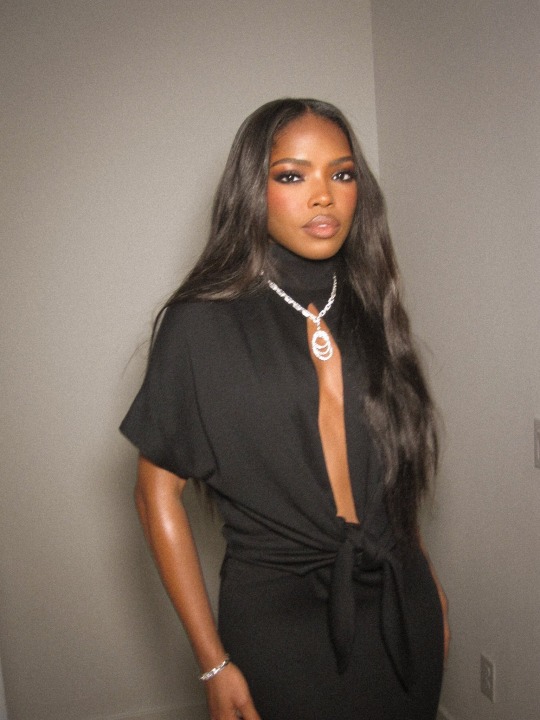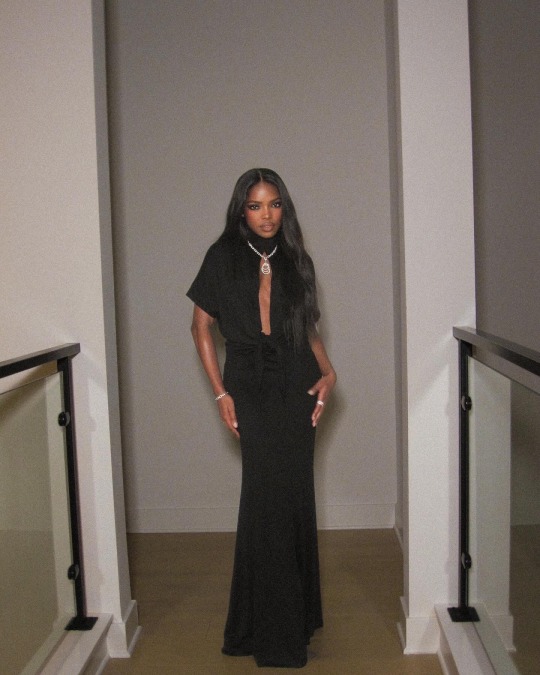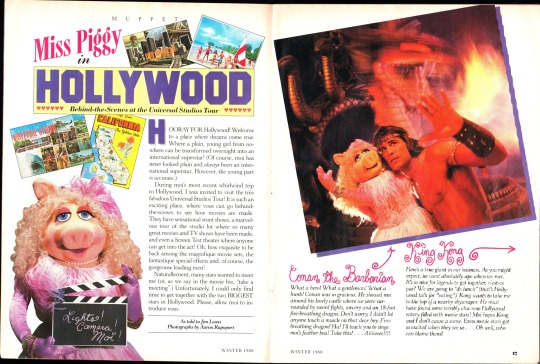#hollywood studio magazine
Explore tagged Tumblr posts
Text

Marilyn Monroe poster in Hollywood Studio Magazine Volume 20 Issue 8 (August 1987)
35 notes
·
View notes
Text

"Hollywood Studio Magazine", July 1968
#roman polanski#clippings#scrapbook#Rosemary's baby#1968#Hollywood Studio#Hollywood#Hollywood Studio Magazine#Magazine
1 note
·
View note
Text


Screenland magazine, January 1938

#peter lorre#1930s#1938#M#hollywood#old hollywood#vintage hollywood#classic hollywood#studio system#insanity#philosophy#screenland#screenland magazine#movie magazine#magazine#cats of tumblr#cat#cats
24 notes
·
View notes
Text





Ryan Destiny’s most recent Instagram post 🤎
#ryan destiny#rd#rdupdates#vanity fair#amazon mgm studios#party#hollywood#blackgirlsrock#blackgirlmagic#black girl beauty#black woman appreciation#black women#black woman#blackgirlbeauty#black fashion#w magazine#best performance#black cinema#black movies#black actress#black actresses#blackactressesdaily
17 notes
·
View notes
Text


Miss Piggy in Hollywood
Muppet Magazine Issue 21 (Winter 1988)
#miss piggy#muppets#universal studios#80s#1988#king kong#conan the barbarian#muppet magazine#pop culture#universal studios hollywood
17 notes
·
View notes
Text
Radio Free Skaro #961 - Kiss Kiss Boom Boom
Radio Free Skaro #961 - Kiss Kiss Boom Boom - #Doctor Who "Boom" review! - Pertwee's Burgers! - STATS! - And more!
http://traffic.libsyn.com/freyburg/rfs961.mp3 Download MP3 Steven Moffat returns to the world of Doctor Who with Boom, a tension-filled episode with land mines, Anglican Marines, many a trope from his previous era, and more! The Three Who Rule are well-known Moffat-ites to be sure, but did this measure up to their thoughts and prayers? Plus the media blitz continues with Hollywood Reporter,…

View On WordPress
#73 Yards#Bad Wolf Studios#bbc one#Big Finish#Boom#Brandon Schatz#Danica LeBlanc#Disney+#Eisner Award#Hollywood Reporter#Jane Tranter#Jon Pertwee#Julie Gardner#Ncuti Gatwa#Season 1#Stats#Steven Moffat#Time Magazine
3 notes
·
View notes
Text

Empire Magazine (Summer 2022)
2 notes
·
View notes
Text

I have never seen these Tower of Terror window display mannequins captured as clearly as these photos in Celebrations magazine July/August 2011 issue. The article doesn’t mention them, but this was such a cool surprise!
#disney world#mannequin#mannequins of disney world#disney props#mannequins#wdw#disney#disney hollywood studios#tower of terror#celebrations magazine
14 notes
·
View notes
Text

When Caroline Brake burst onto the scene with her breathtaking performance in Old Ways to Die, the whispers around Hollywood were deafening. A Best Actress Oscar nomination at just 25? The trajectory seemed set—blockbuster roles, high-fashion campaigns, a steady climb toward superstardom. But Caroline, with her sun-kissed Venice Beach roots and a penchant for defying expectations, has taken a decidedly different approach. And, as it turns out, we’re all under her spell.
I meet Caroline at a tucked-away café near her Venice Beach bungalow. She’s the picture of effortless cool in a fitted t-shirt, nothing with her but her trusty tote bag and a radiant smile that feels like it belongs more to an old friend than a rising Hollywood star. As she orders her matcha latte—pausing to chat animatedly with the barista, whose name she knows both first and last—it becomes clear that this isn’t an act. Caroline Brake is as genuine as she is magnetic.
When I asked her if side-stepping Hollywood expectations is something that comes naturally to her, she says “You could definitely say I’ve been dancing since the womb,” and she settles into her seat with a lightness that feels almost choreographed. “Well, I don’t want to take too much credit. My mom—Maggie Brake—has been a dancer for 47 years. Her whole life is a kind of dance, this flow of energy and creativity. I grew up watching that, absorbing it. I’m constantly catching myself doing things just like her, and honestly, I love it. It’s like rediscovering her magic in my own way.”
Maggie Brake is something of a local legend in Venice Beach, where she raised Caroline. A former Broadway dancer, Maggie stepped onto the Great White Way for just five years, but her impact was indelible. “She was in the right place at the right time,” Caroline explains, pride evident in her voice. That “right place” happened to be in front of the creators of A Chorus Line, who immortalized her story—and by extension, her legacy—in one of the most iconic musicals of all time.
But Maggie’s decision to trade Manhattan’s bright lights for the laid-back sands of Venice Beach is a move that feels quintessentially Brake. “She’s always been about staying true to herself, and I think I’ve inherited that,” Caroline muses.
It’s this blend of authenticity and artistry that sets Caroline apart in an industry obsessed with predictability. While others might chase the traditional path to stardom, she’s content charting her own course, one that feels deeply personal, like an interpretive dance through the world’s expectations.
As my conversation with Caroline deepens, the veneer begins to shift, revealing a young woman whose grounded perspective feels almost radical in the shimmering world of Hollywood.
Growing up in her mother’s dance studio, Caroline explains, wasn’t always as idyllic as it might sound. “My mom struggled to keep that studio open year after year,” she says, her voice softening. “She was a single mother with no financial safety net, so I saw firsthand what it meant to work tirelessly for something you believe in.”
That early exposure to grit and resilience instilled a work ethic that Caroline carries with her to this day. “I’ll never be under the impression that what I’m doing isn’t a job,” she says plainly. And it’s here, in this unvarnished honesty, that the carefully layered aura of ease begins to give way to something more vulnerable—and more real.
“As passionate as I am about film, and as much as I was raised to be an artist first and foremost, I honestly can’t approach this process emotionally,” she admits. The statement feels almost like a confession, peeling back the layers of the free-spirited persona she’s cultivated.
Instead, Caroline approaches her work with a sharp pragmatism, prioritizing the collective experience of the cast and crew above all else. “I feel this enormous pressure to make sure everyone I work with feels valued and like they’re in the best environment possible to do their best work,” she explains. “Because it is work. Hard work. It’s insane hours, monster tasks, and sometimes you’re just completely overwhelmed by the thought that it could all be for nothing.”
She pauses, her gaze momentarily distant. “What if no one likes the movie? What if no one even shows up in the first place?”
Caroline leans back in her chair, all her introspection at odds with her energy, which is as effortless as the ocean breeze. She’s been candid so far—about her work ethic, her anxieties, and the pressure of ensuring every set she steps onto is a haven for creativity. But when I bring up the inevitability of facing failure, her demeanor shifts slightly, her confidence tempered by a quiet humility.
“The same plan as always,” she says, her eyes sparkling with a mix of self-awareness and determination. “Show up, work as hard as I can, be as present as possible, and just… be unwavering.” She pauses, then laughs, the sound warm and disarming. “I guess all of that’s easy to say while I’m still on this side of success.”
It’s this balance of conviction and realism that makes Caroline so intriguing—a star who’s not only self-assured but also deeply aware of the fragility of her position.
I ask if her unorthodox approach to selecting projects and collaborators is part of her strategy for keeping her career fresh and her work resonant. Her answer comes quickly, without hesitation.
“Oh, absolutely,” she says, leaning forward slightly, as if sharing a secret. “It’s easy for me to have faith in the work and the people I work with when I’m working with auteurs. The crews they bring with them? They’re often the same people they started out with—the ones they went to film school with, the ones who’ve been with them since the beginning. There’s this incredible sense of trust and collaboration because they’ve already laid such a strong foundation for a great set. And when that’s in place, everything else feels easy.”
There’s a reverence in her tone, a clear appreciation for the artistry and community that auteurs foster. It’s also a testament to her discernment, a rare quality in an industry that often prioritizes profit over process.
As our conversation winds down, it’s clear that Caroline Brake isn’t just navigating Hollywood on her own terms—she’s doing so with a vision that feels both bold and deeply rooted in authenticity. Whether or not she ever faces the specter of failure, one thing is certain: she’ll face it with the same unwavering grace that’s brought her this far. And if her track record is any indication, she’ll emerge all the stronger for it.
#vogue#vanity fair#people magazine#the Hollywood reporter#celebrity#celebrity culture#parasocial relationship#celebrity news#hollywood#venice beach#lana del rey#oscars#movies#film#hollywood studio#la la land#dancer#broadway#a chorus line#creative writing#original character#actress
0 notes
Text
This Date In Manka Bros. History - November 2, 1960
Studio Chairman and CEO Khan Manka, Jr. (son of co-founder Harry Manka and nephew of founder Khan Manka [Sr.]) is born in Beverly Hills.

#TDIH #today #TodayInHistory #beverlyhills #hollywoodstudios #hollywoodhistory #hollywood #disney #waltdisney #warnerbros #jackwarner #satire #parody #comedy #burbank #moviemogul #lifemagazine #babyboy #babypictures
#parody#satire#funny#hollywood#movies#bulgaria#hollywood history#today in history#hollywood studios#beverly hills#disney#warner bros#walt disney#jack warner#bob iger#comedy#burbank#movie mogul#life magazine#baby pics
1 note
·
View note
Text
Shelving Movies for Fun and Profit
Destroying Movies for Fun and Profit
If you ask any director, screenwriter, actor, stunt performer, gaffer, editor, cameraperson or other Hollywood worker, they’ll likely tell you a variation on the same story: “My dream, ever since I was a little kid making home movies, was to one day grant Warner Bros. a deduction for a loss sustained upon the abandonment of property (reported on Form 4797).” Yes, little is more exciting for an aspiring filmmaker than the idea that—with a lot of dedication and a pinch of luck—their years of driving Lyfts and waiting tables could pay off, resulting in a star-studded line item that will be shelved forever so that a major studio can claim a tax write-off. Ah, the magic of the movies!
This practice is back in the news because the powers that be at WB have gone back to their original decision regarding the hybrid live-action/animated Looney Tunes movie Coyote vs. Acme. Despite the film testing well and generating plenty of buyer interest, a team of execs who haven’t seen the finished movie look like they’re going to “unceremoniously delete it” for tax purposes. Sorry, filmmakers, but apparently it actually looks better to stockholders if WB doesn’t actually put movies out. “Hollywood accounting” has its reputation for a reason, but it’s never been so obviously broken.
It might seem like Warner Bros. Discovery CEO David Zaslav is a true innovator of idiocy, but the man behind the permanent shelving of movies like Batgirl and Scoob! Holiday Haunt is just ramping up a long tradition of burning art to save a quick buck.
After buying up DreamWorks, Universal decided to bury the musical-comedy Larrikins instead of selling it to Netflix. Universal president Jimmy Horowitz told Tim Minchin that “It’s schmuck insurance – if someone made a lot of money out of it, we’ll look like schmucks.” That mindset certainly applies here: Coyote vs. Acme is a creation from an earlier group of WB leaders, and would naturally be on the chopping block from a spiteful new C-suite who also happens to hate movies.
Even more relevant is a case from almost 100 years ago: Charlie Chaplin literally torched the film negatives of A Woman of the Sea back in 1933, in front of multiple witnesses, so that he could claim the movie as a loss for tax purposes.
The tax code may have changed since then, but the logic remains the same: Get rid of the movie so you can avoid all the final complications and lingering expenses associated with its “useful life.” If you cut that life short, pulling off an accounting assassination, you save a little immediate cash at the low, low cost of…art. It’s always been a crass practice, more often performed by resentful new regimes or moneygrubbers who’ve found themselves attracting the gaze of Sauron’s IRS. But now shelving movies, completed films that other companies want, is picking up steam as standard practice. Actually making things is such an outdated, small-time business model. It’s far more lucrative to remove things other people made.
For example, if Disney keeps all of its movies and TV shows on Disney+, it has to pay residuals to the people who made them. They’ve also spread out the costs of a movie like Crater (which was available to watch for a mere seven weeks during the summer of 2023) over the years that the movie will ostensibly be available to the public and, therefore, creating value for Disney. Remove these movies and shows from the streamer, or better yet, remove them permanently (like Disney did with Crater), and their value can be added to an impairment charge—basically, a claim to the tax man that something a company owns has become, suddenly, worthless.
Disney recorded a $1.5 billion impairment charge last year. As Julia Rock points out, this means that Disney is claiming something pretty odd: Both “that the assets were producing so little value that it’s cheaper to destroy them than to keep them and that the assets were worth $1.5 billion.” Huh. There’s no push for anyone to justify this contradiction. The IRS isn’t asking questions. It doesn’t matter if a movie is good, or bad, or somewhere in between. It doesn’t matter if it had the potential to one day be rediscovered as a cult classic. It certainly doesn’t matter that even the worst pieces of Z-grade trash are still worth preserving as cultural artifacts. As an aside, the HBO Original Fahrenheit 451 is still streaming on Max.
And sure, you can say that you didn’t want to watch those movies anyways. Kid movies! Superheroes! Cartoons, yuck. I get it, you’re tough and cool. But one day, this will happen to something that you were looking forward to. It will happen to something that would have moved you. Something you’d have remembered fondly, something that would’ve turned your day around. But even if you’re the most jaded, anti-art, movie-hating curmudgeon, you should remember that, released or not, you’re helping pay for this scheme anyways.
“When intertwined with public funding through state and federal tax incentives, the practice of movie and television write-downs represents a troubling exploitation of taxpayer funds,” writes tax attorney Andrew Leahey. “Coupled with rapidly expanding state tax incentives, it represents a multibillion-dollar Rube Goldberg machine that culminates in a nickel being pulled from your pocket, strapped to an Acme rocket, and fired directly into the bank accounts of movie studios.”
Every loophole taken by these studios doesn’t just rob us of art. It burns the work of countless artists. It steals from our quality of life by monkeying around with our broken tax system, allowing our most powerful corporations to skip out on their bills. It picks the remaining shreds of flesh off the bones of our culture, all to further fatten a few vultures at the top.
Politicians like Texas Representative Joaquin Castro are calling for the government to “review this conduct,” but the only people who seem to have the power here are those actually creating the movies. They can boycott the guilty studios, and we can support them, but there are so few left that aren’t exploiting this practice to its most predatory extremes. Cooking the books has always been a Hollywood practice. Burning them is new.
Jacob Oller is Movies Editor at Paste Magazine. You can follow him on Twitter at @jacoboller.
For all the latest movie news, reviews, lists and features, follow @PasteMovies.
It's too bad that this Paste article was written by a Leftist, who let their biases show, ie pushing Castro, and the 'Sauron's IRS'. But otherwise, it is spot on. What the studios are doing to Intellectual Properties is a SIN. It's cruel, it's greedy and so fucking unnecessary. Just how much money do these studios and their shareholders, NEED? I better not find out that the Supernatural Planet Series was destroyed.
#Warner Bros Discovery#A Canadian Company#Universal Comcast#Paramount Global#Disney Company#Killing Art#Tax Loopholes#Wall Street#State Tax Incentives#Same Thing About To Happen In Britain#Movie Studio Expansions#Hollywood Mafia#Supernatural Planet Series#SAG-AFTRA#Academy of Motion Pictures#AMC Theaters#Has It Occurred To Studios That People Will Want To Go To Theaters Even Less In This Atmosphere?#Paste Magazine#Oscars 2024#Charlie Chaplin
0 notes
Text

Ad for Hollywood Studio Magazine in Hollywood Studio Magazine Volume 20 Issue 8 (August 1987)
25 notes
·
View notes
Text
Nina Svet Is Winner of Mrs European Universe 2023
Nina Svet is the winner of Mrs European Universe 2023 On February 23, 2023, the Mrs European Universe pageant was held at the Taglyan Complex 1201 North, 1219 Vine St, Los Angeles, CA 90038 from 5:30 pm. The event held a red carpet arrivals, dinner banquet, celebrity judges and live performances. Nina Svet is the winner of Mrs European Universe 2023. Mrs European Universe 2023 Mrs European…

View On WordPress
#Actor Ken Davitian#beauty pageant#Diversity News Magazine#Diversity News Radio#Diversity News TV#Diversity Pageants USA#DiversityNewsMagazine.org#Esteban Escobar#Esteban Steven Escobar#Francois Palais#Hollywood Breaking News#Manila Up#Mrs European Universe#Mrs European Universe 2023#Nina Svet#Nina Svet Mrs European Universe 2023#Pageant Contest#Red Carpet event#SAS Movie Studio#Shawn Anthony Sequeira#Sonia D Bermejo#Steven Escobar#Virgelia Productions#Virgelia Villegas
0 notes
Text

Silver Screen magazine, April 1940
#susan hayward#beau geste#mystery ship#ray milland#paramount#studio system#1940#1940s#hollywood#old hollywood#classic hollywood#vintage hollywood#silver screen#silver screen magazine#movie magazine#magazine#laughing#laugh
22 notes
·
View notes
Text
Oingo Boingo - Dead Man's Party 1986
"Dead Man's Party" is a song by American band Oingo Boingo, released as the third single from their fifth studio album of the same name. The song was released on a 12" single in conjunction with another song from the album, "Stay". It is perhaps best known for its appearance in the 1986 film Back to School, where the band performed it at a party.
The lyric, "I hear the chauffeur coming to my door/Says there's room for maybe just one more," is a reference to "The Bus-Conductor," a short story by E. F. Benson about a hearse driver, first published in The Pall Mall Magazine in 1906. The story has been adapted several times and spawned an urban legend, with each version using the catchphrase, "Room for one more".
Danny Elfman performed the song as the final encore of his Nightmare Before Christmas concerts at the Hollywood Bowl in 2015, 2016, and 2018, and at Banc of California Stadium in 2021, alongside his former Oingo Boingo guitarist and arranger Steve Bartek.
"Dead Man's Party" received a total of 80,9% yes votes! Previous Danny Elfman polls: #5 "This Is Halloween".
youtube
672 notes
·
View notes
Text
The queen of dubious Hollywood plagiarism cases is Sophia Stewart. She's the woman who The Matrix and The Terminator were stolen from, if you've heard that legend; she won a billion dollars and her victory over the studios was so big it was only ever reported by...the college paper of Salt Lake Community College. In truth she didn't win the case, she won the right to not have it dismissed, which it eventually was when she failed to show up.
Like, she wasn't claiming The Matrix and The Terminator were stolen from her work as a whole; she claimed they were stolen from the same story, even though the only real similarity they have is "robots destroyed the Earth and there's human rebels". How can this be? Well the story was unpublished in the 80s. But you can buy it now! ...but that version's from after she made her case, so who knows if it looks like the original. The Amazon reviews include a lot of glowing ones from people without avatars, and a lot of one star ones from people who seem to exist saying that it's more or less a plot outline and the majority of the book is just legal documents
But you don't have to dig into that bc she claims she sent it to a contest for story ideas run by the Wachowskis. In 1986. When they were not only not filmmakers, but a teenager and in college respectively. That's ten years before they made their first feature film, and she claims they were running a contest for story ideas in a national magazine she cannot name, even though she obsessively documents every other aspect of the plagiarism case. You literally don't have to look up any other facet of her argument: this one basic fact making no sense chronologically, and being the only element she can't produce, lets you dismiss the rest. The Wachowskis simply were not running national filmmaking competitions when they were in college
And yet! It spreads. It still spreads. When the fourth Matrix movie came out there were "Actually, the Wachowskis stole The Matrix from an African-American woman" reminders everywhere. It spreads on TikTok, Twitter, and even Tumblr. All from people who haven't actually tried looking up her story, and who are going off a Utah community college paper's misinterpretation that her slightly delaying losing her case was somehow her winning billions. It sounds good, and that's all that matters
806 notes
·
View notes